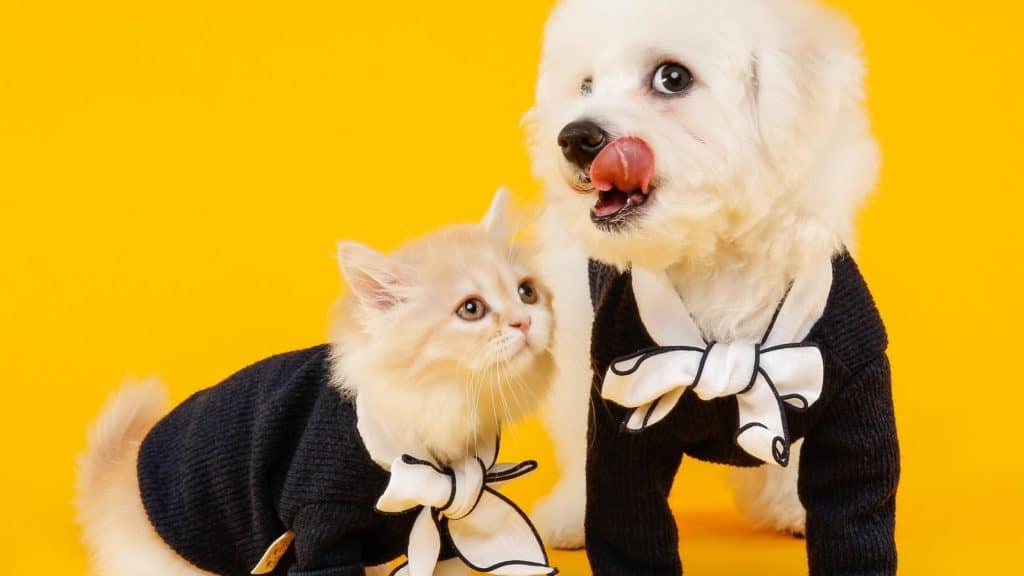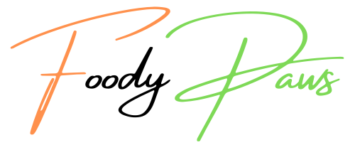
While felines and dogs can coexist peacefully in your residence, it is okay for your cat and dog to share the sofa, but sharing food can be risky for your pup. If you have a doggo, you’ve possibly seen that it is crazy about eating cat food.
Although eating cat food sometimes is unlikely to result in your dog any harm, you should not give it daily. let’s learn why is cat food bad for dogs?
Pups are omnivores by nature. Hence, they need a balanced blend of vegetables and meat. But if your pup shifts to a cat-based food, many health problems might arise. So, are you wondering how eating a cat meal can be detrimental for your dog?
Well, here is everything you need to know.
One of the necessary is the best cat food bowl to feed your cat either wet or dry food. Having a good quality and suitable bowl makes the eating experience more smooth for cats.
Why is cat food bad for dogs?
It’s undoubtedly not safe for dogs to consume cat food. While the feline meal is unlikely to be immediately harmful or toxic for your pup, there are significant dissimilarities between the nutritional needs of cats and dogs.
So, indeed, you should not make it a habit for your dog to consume cat food regularly.
Cat food is high in protein, calories, and fat which means cat meal is not suitable for pups. Pups with sensitive stomachs can experience diarrhea, sickness, and gastrointestinal upset after consuming cat food.
In addition, those dogs that eat cat meal daily are at high risk of developing potentially life-threatening diseases like pancreatitis and obesity.
However, having indicated that, unlike harmful ingredients such as chocolate, stealing and consuming cat food from an inattentive cat’s container is highly unlikely to kill your pup.
Why are dogs so fond of cat food?
Undoubtedly, dogs love feline food. Some pups like it so much that dog parents utilize feline meals as a high-value delight to reward them for their outstanding performances.
Besides, their intense love for cat food forces numerous cat parents to feed their felines in different places out of their pup’s reach.
Cat meal has a higher content of meat-based protein than pup food. This type of meal seems delightful to pups as the meat flavor and its smell are too strong to attract it.
Nonetheless, just because canines crave cat food, it doesn’t mean dogs should consume it.
Unless your vet suggests otherwise, the best nutriment for your dog is a solely-dedicated pup food, not your cat’s meal.
Can puppies eat cat food?
If your puppy steals some cat food from time to time, it is not an issue. Nonetheless, providing your doggo with feline food daily and as an alternative for a puppy’s sufficient nutrition is a different matter.
For baby dogs that are still in need of a nutritionally balanced meals, special puppy foods are perfect for their quick development rate.
But providing your puppy with feline food can result in musculoskeletal issues and can rapidly make your puppy overweight.
So, what’s the difference between dog and cat food?
Whether you are a cat or dog parent, you possibly find yourself thinking about the dissimilarity between their food types. Well, some crucial nutrients that felines need to withstand aren’t found in pup food.
Also, on the contrary, pups might get a disturbed stomach if they consume too much feline meal.
So, here are a few differences between dog and cat food explained in detail.
Dog food doesn’t contain the nutrients that felines need
At first glance, cat and dog food seem strikingly the same. Both the meals are dry kibble that is available in the same looks and shapes. They are available in bags and even have the same smell.
But the dog and cat foods are very diverse when it comes to components.
Dog meals lacks some crucial nutrients felines must have to live. Pups are omnivores and can survive on many things, from grain and meat to vegetables and fruit. In general, pup foods may have a mixture of animal proteins, vegetables, and grains.
Felines, on the contrary, are far more restricted on what they need to consume to live. As felines are obligate carnivores, they mainly obtain their nutrients from the flesh, not plant substances.
Feline food aims to offer taurine to cats, which is a vital nutrient for them. While some dog food might contain taurine, it is not adequate to fulfill a feline’s needs.
Dog food also doesn’t contain the optimum amount of vitamin, niacin, and arachidonic acid that cats require.
Dog food is not much delicious for cats
Besides, the flavor is another significant dissimilarity between cat food and dog. Dog meal is crafted to entice pups, and there are certain aspects to the taste palette that felines won’t enjoy.
Besides, felines have limited taste buds than pups, and cats can’t distinguish sweetness at all. Thus, felines won’t appreciate dog foods much. On the contrary, dogs may like cat food because of the high protein ingredients.
However, you should not allow your pup to consume as much cat food as it wishes.
Despite their type as Carnivora, pups are deemed as omnivorous. It implies that even though dogs like flesh, they can also consume plant material and live with such food.
Besides, pups have also displayed the capacity to digest carbohydrate-based nutriments.
Pups don’t have a harsh requirement for taurine. Unlike felines, they don’t rely on meat-specific protein and certainly don’t need to eat a higher protein level to meet their basic dietary needs.
Besides, recent research has found that pups, unlike wolves, have adapted to consuming a starch-rich diet as a portion of domestication.
Possible complications that may arise if your dog eats cat food
If your pup consumes a lot of feline food daily, difficulties may happen, as it does not contain the proper balance of fiber, protein, and other ingredients that pups require to stay healthy.
Given below are the complications that can arise when your doggy eats cat food.
Obesity:
If your pup daily consumes feline food, it could become fat faster than if pups consumed a proper diet crafted for a dog’s dietary requirements.
Your dog does not require as much protein or fat as is found in a diet made for felines, and the extra will make your dog put on weight rapidly.
Well, the weight increase is not the only after-effect of feline food for pups, so providing them with feline food to help them increase their weight is not suggested.
Vomiting:
Excess fat can disturb the sensitive stomach of your pup. It could make your pup vomit. Well, if your dog accidentally eats feline food, don’t worry.
While it possibly is messy and disgusting for a little while, your dog will settle itself rapidly. Seek clinical help if it does not, as it can accelerate a more severe circumstance.
Diarrhea:
Besides vomiting, if your pup consumes too much feline food, it can also have diarrhea. The fats and oils in the feline food can make its stool loose.
This, along with the discomfort of the stomach, will provide your pup with some severe runs to the toilet.
Pancreatitis:
Pancreatitis is a rash of your pup’s pancreas. The main reason for its occurrence is its high-fat food. When canines consume massive amounts of fat, they have a higher chance of this illness.
It can be extremely severe, but the signs generally indicate a less critical condition.
However, if you notice your dog has diarrhea, often vomits, experiences distension or pain, or hunches its back, seek clinical help as all these are signs of pancreatitis.
Tip to Prevent a Dog From Eating Cat Food
Training your pup to stay away from your feline’s food is crucial in keeping your pets healthy. Indeed, dogs can be stubborn, particularly when it comes to treats and food.
Fortunately, there are strategies to keep your pup away from consuming feline food. So, consider the following tips to do so.
1. Feed your cat and dog separately
If your pup doesn’t notice the feline food, they won’t be eager to eat it. As an additional bonus, when you feed your doggo and kitty separately, both the creatures can have their respective meal in peace.
You can give them food in separate areas, or if that is not possible because of space constraints, feed on opposite sides of the compartment.
2. Clean food containers soon after your dogs and cats finish eating
By cleaning the food bowls after every meal, you can prevent your dogs from getting attracted to the smell of the leftover food.
In addition, it will prevent your pup from snatching any crumbs out of the feline container.
This practice can also resist germs out of your dog’s containers.
3. Store your pet’s nutrients in a safe place
Keep your pet’s food out of your pup’s reach. It will stave off your dog from enabling himself to have an extra snack or meal for your cats.
As a caring pet parent, you need to know how much-wet cat food is for cats is necessary for a day and how long it takes for a cat to digest food to offer more.
To offer something premium, learn how to make your cat food so you can include the ingredients which are not possible with commercial foods.
Conclusion
Knowing whether pups can consume cat food is a crucial consideration in a multi-pet home. Dogs that eat cat food daily are at risk of more severe health issues.
So, you should always keep your feline’s meal out of your pup’s reach.
However, if you doubt your doggo has consumed a substantial amount of cat food, you should contact the vet immediately.
